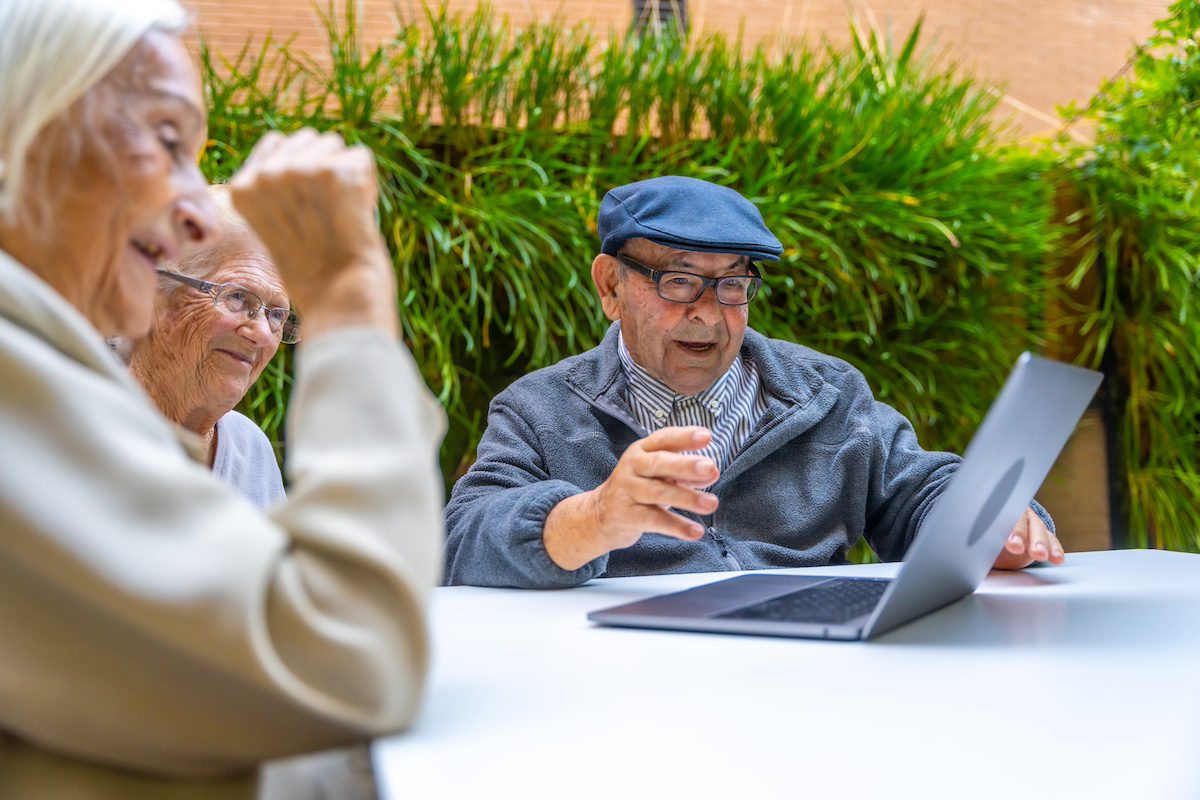As we age, maintaining optimal brain health becomes increasingly crucial. Cognitive health is a key aspect of overall well-being, especially in our golden years.
Seniors can actively contribute to the preservation and enhancement of their cognitive abilities through engaging in various activities designed to stimulate the mind.
In this month’s blog post, we delve into the world of cognitive activities and their profound impact on the well-being of seniors.
Understanding Cognitive Activities
Before we explore the benefits, let’s define cognitive activities. These are tasks and exercises that challenge the brain, promoting mental agility and sharpness. From solving puzzles to participating in social activities, these engagements play a pivotal role in keeping the mind active.
The Connection Between Cognitive Activities and Brain Health
Scientific studies consistently affirm the positive correlation between cognitive activities and brain health. Engaging in such activities has been shown to reduce the risk of cognitive decline, offering a protective shield against conditions like dementia.
Additionally, regular cognitive stimulation has been linked to improved memory retention and enhanced problem-solving skills in seniors.
Types of Cognitive Activities
Mental Exercises and Puzzles
Seniors can indulge in a variety of mental exercises, including crosswords, Sudoku, and memory games. These activities stimulate different parts of the brain, promoting neuroplasticity.
Engaging in regular crossword puzzles, for example, challenges the language and memory centers, fostering mental flexibility and enhancing cognitive resilience over time.
Physical Activities with a Cognitive Component
Combining physical exercise with cognitive challenges, such as dance or yoga, not only benefits the body but also enhances cognitive functions.
Dancing, in particular, requires coordination and memorization of steps, providing a dynamic cognitive workout that promotes both physical and mental well-being. This holistic approach contributes to overall cognitive vitality.
Social Engagement as a Cognitive Stimulant
Regular social interactions are akin to a workout for the brain. Engaging in conversations, sharing experiences, and participating in group activities all contribute to cognitive well-being.
Joining clubs or social groups not only provides mental stimulation but also fosters a sense of belonging, positively impacting emotional and cognitive health. These social interactions serve as a powerful catalyst for maintaining cognitive sharpness in seniors.
Tailoring Cognitive Activities for Seniors
It’s essential to tailor cognitive activities to individual preferences and abilities. Caregivers and family members can play a crucial role in understanding the unique needs of seniors and providing suitable activities.
Recognizing that each senior has distinct interests, caregivers can personalize cognitive activities, ensuring they align with individual hobbies and preferences.
This personalized approach not only enhances engagement but also makes the activities more enjoyable and fulfilling for seniors.
Challenges and Solutions
Implementing cognitive activities may face challenges, but creative solutions abound. Whether it’s adapting activities to physical limitations or finding innovative approaches, addressing challenges is key to success.
For instance, if mobility is a challenge, incorporating seated exercises or virtual reality experiences can provide stimulating alternatives.
Identifying and overcoming obstacles not only enhances the effectiveness of cognitive activities but also reinforces a sense of accomplishment and empowerment among seniors.
Benefits Beyond Brain Health
The positive outcomes of cognitive activities extend beyond brain health. Seniors often report improved mood, reduced stress, and a heightened sense of purpose when regularly engaging in stimulating activities.
Beyond cognitive benefits, these activities contribute to a holistic sense of well-being. The joy derived from solving puzzles or participating in social events fosters emotional resilience, creating a positive feedback loop that enhances the overall quality of life for seniors.
Integrating Technology for Cognitive Stimulation
Embracing technology opens up a new world of possibilities. Specialized apps and games cater to seniors, offering interactive and entertaining cognitive exercises. Virtual reality experiences can also provide a novel and engaging dimension.
As technology advances, seniors can explore not only traditional cognitive games but also immersive virtual environments designed to stimulate various cognitive functions, providing a futuristic and enjoyable approach to mental fitness.
Community Programs and Resources
Local initiatives and organizations actively promote cognitive health in seniors. Accessible resources, workshops, and support groups are valuable tools for those seeking to embark on a journey of cognitive well-being.
Community programs offer a network of support, creating opportunities for seniors to share experiences and access resources that cater to their specific cognitive needs. These programs foster a sense of community and collaboration, enriching the overall cognitive well-being of seniors.
Incorporating Cognitive Activities into Daily Life
Making cognitive activities a seamless part of daily life is essential. From simple memory exercises to group activities in community centers, the integration should be effortless and enjoyable.
Incorporating cognitive activities into daily routines can be as straightforward as starting the day with a crossword puzzle or joining a local walking group that encourages social interaction.
The key is to make these activities accessible and enjoyable, seamlessly blending them into the fabric of everyday life for long-lasting cognitive benefits.
Challenges in the Modern Lifestyle
In the era of technology, addressing challenges related to sedentary behavior and excessive screen time is vital. Striking a balance between staying connected and engaging in physical and mental activities is key.
Encouraging seniors to take regular breaks from screens and incorporating physical exercises that involve cognitive components, such as interactive video games or online classes, can help mitigate the challenges posed by the modern sedentary lifestyle.
Achieving harmony between technology use and active engagement is crucial for maintaining optimal cognitive health in the face of contemporary challenges.
Measuring Cognitive Improvement
Tracking progress is essential. Various tools and assessments help measure cognitive improvement, providing seniors and their caregivers with tangible evidence of the positive impact of their efforts.
Whether using cognitive tests, memory assessments, or self-reported improvements, having measurable benchmarks allows seniors to celebrate their achievements and motivates them to continue engaging in cognitive activities for long-term brain health.
Final Thoughts
In conclusion, promoting brain health through cognitive activities is a journey worth undertaking. By incorporating a variety of activities into daily life, seniors can not only safeguard their cognitive functions but also enjoy a more fulfilling and vibrant lifestyle.
Embracing this proactive approach not only enhances cognitive well-being but contributes to a rich and satisfying overall quality of life for seniors, emphasizing the profound impact of maintaining an active and engaged mind.


